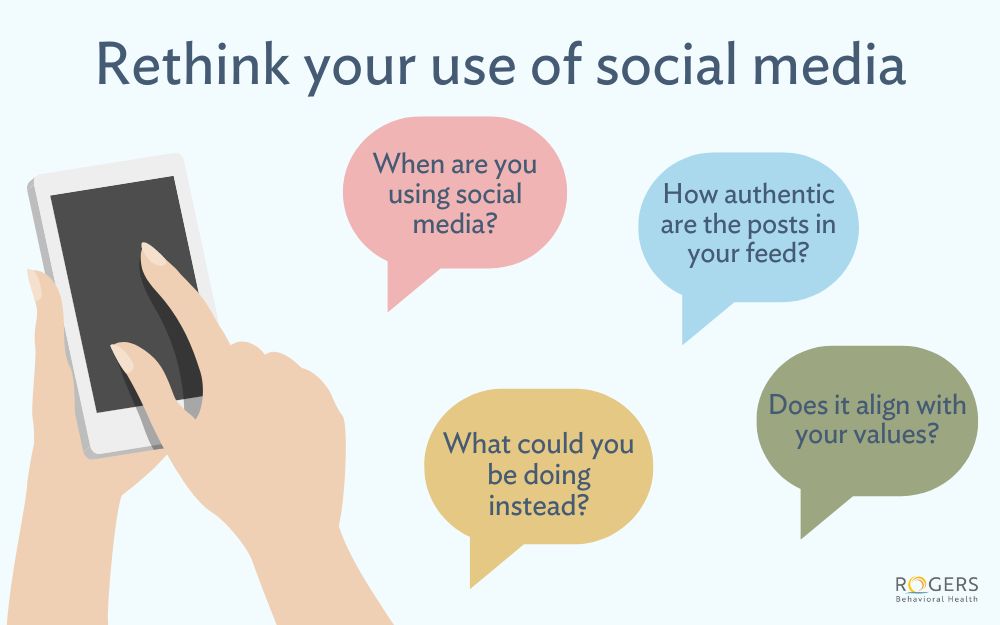While social media can connect us around the world, it doesn’t always give us a clear picture of it.
“I really want people to be aware that what they’re seeing in social media is not just a random sampling of what’s out there. What they’re seeing is not a true picture of reality,” says Nicole Stettler, PhD, executive director of Rogers Behavioral Health’s Eating Disorder Recovery Services. “It’s like comparing your blooper reel to someone else’s highlight reel.”
Social media and its impact on mental health:
- Sleep problems
- Depression
- Poor self-esteem
- Body dissatisfaction
Nearly always at our fingertips, social media apps and all their seemingly endless feeds of images, videos, and messages are now widely used across generations, but ways to address their potential negative impacts aren’t as easily found – at least with mental health treatment plans.
“In pretty much every manualized, evidence-based eating disorder treatment, there isn’t a focus on social media and media in general,” she says. “The existing frameworks are great, but they just haven’t caught up with the times that we’re living in.”
As Dr. Stettler developed new treatment plans for Rogers’ Eating Disorder Recovery Services, she incorporated content and activities that can be beneficial for anyone who has social media within arm’s reach.
Dr. Stettler advises taking a close look at your social media usage and asking questions, like:
- When am I using social media? You can take a day to track when you scroll on certain apps and find patterns in your usage, whether manually or by using an app to track your usage. You may find times when you’re more likely to pick up your phone when you might prefer to tackle other activities. You might also be surprised by just how much time you spend on your phone.
- Why am I using social media, and what could I be doing instead? Many of the reasons we turn to our phones are good, like for relaxation or connection. But you can also ask what alternatives there are, such as taking a walk or calling a friend.
- How authentic are the posts in my feed? Many messages have ulterior motives (such as to keep you scrolling), and not all posts are an authentic representation of someone’s real life (consider filters, and remember the idea that many are only posting their highlight reels). It can help to take time and question if this is an accurate representation of reality – especially before you compare yourself to unrealistic standards.
- Is my social media use aligning with my values? Ask yourself what you’re trying to get out of your social media use, if your approach feels good, and is it working. For example, if you value connection, are you feeling closer to your loved ones, or is there a better way to accomplish that, either with social media or something else offline?
In addition to asking questions, Dr. Stettler says you can take action to improve your social media experience:
- Tailor your feed: Take the reigns and make social media work for you. Instead of following accounts that make you feel bad about yourself, can you purposefully decide to follow positive accounts that make you feel good?
- Acknowledge algorithms’ power – and fight back: While we have some say over what shows up in our feeds, algorithms will feed us more of whatever we pay attention to. If you think strategically and swipe past content we don’t want in our feeds, we can take back some control.
- Portray yourself accurately, as well: Beyond seeking out authentic content, Dr. Stettler says some research shows it helps if you focus on portraying yourself as authentically as possible, as well. This will vary based on social media platform (this will likely look different on Facebook compared to LinkedIn), but when presenting ourselves in a way that feels fake can make us feel worse about ourselves, it can help to find ways of portraying yourself that feel real and good.
At the end of the day, Dr. Stettler says there’s nuance in mental health and social media research, meaning it’s not all bad. If you’re intentional in seeing the potential impacts more clearly, you can harness social media for a more holistic view of the world – and improve your own life, too.
“I think we’re going to find there are ways that social media can be just like many other behaviors; it can be healthy for us and there are ways that it can be unhealthy. Rather than making it just black and white, we can try to find a balanced way to approach it,” she says. “It’s not about taking something away, but instead incorporating something else that’s more meaningful.”
Rogers offers mental health and addiction treatment
If you or a loved one is struggling with mental health or addiction, Rogers offers compassionate care. Call 800-767-4411 to get started with a free, confidential screening.


